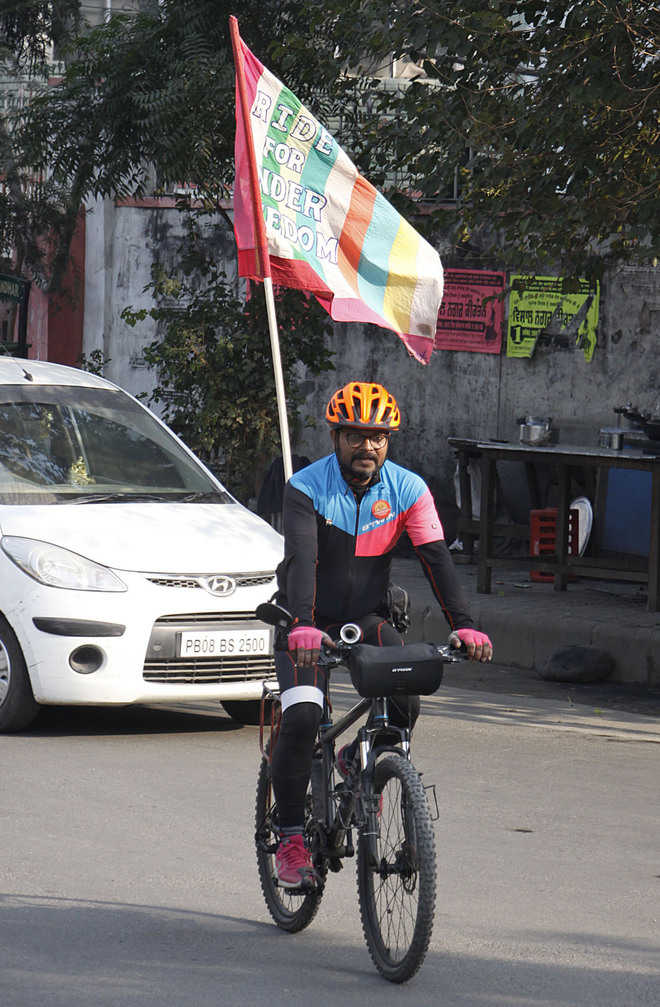
Cyclist Rakesh Kumar on a countrywide wide tour to spread awareness regarding gender discrimination in Jalandhar on Sunday. Photo: Sarabjit Singh
Aparna Banerji
Tribune News Service
Jalandhar, November 26
Peacenik, activist and a potent voice against gender discrimination in the country, Rakesh Kumar Singh (44), who has been traversing the length and breadth of the country on a cycle to spread awareness on the issue, today stopped over at Jalandhar.
Reaching out to listeners and passers-by on a public address system, he stops over at highways, dhabas, colleges addressing motley groups of curious listeners on everything that is wrong about gender bias.
His trigger for taking up the cause – a chance encounter with acid attack victims, who lost their faces following this crime – mostly from near and dear ones.
In Jalandhar until tomorrow, the corporate manager-turned activist, set out from his place of work at Chepak Press Club in Chennai, on March 15, 2014, to travel the country, decoding the dynamics of gender discrimination in various states. He originally belongs to Tariyani, Chapra (Bihar).
It all started with a filmmaker whom he met in Delhi, who was making a film on acid attack victims.
While Rakesh Kumar has been across states and UTs like Pudducherry, Kerala, Karnataka, Andhra Pradesh, Orissa, Bihar, Uttar Pradesh, Madhya Pradesh, Maharashtra, Delhi, Haryana, Rajasthan, among other states, he plans to end his journey in December 2018. While he plans to author a book about his expedition and insights, he also plans to hold a Global Festival for Gender Freedom where people from the grassroots level shall speak on their experiences.
“They didn’t have faces, their faces were gone. The lives of these victims left a lasting imprint on my mind. As it emerged, most of these women had been attacked by jilted lovers or husbands. I thought how can a loved one, who earlier promised them the moon, do that to a woman’s face. Their homes were destroyed and they didn’t have much to look forward to. I was greatly moved by the incident and thought I wanted to do something on it,” Kumar said.
This incident happened in October 2012, while already having quit his lucrative job as manager, corporate relations, where he used to get Rs 90,000, to author a book. After the Delhi encounter, the seed of the idea to traverse the country speaking on gender discrimination, took root in his mind. On March 2014, he started off.
While his venturing out was met with much ridicule from friends, some of whom told him he had lost it, collecting some money to make the initial start, he now makes do with donations and contributions from people he meets, which are graciously deposited into a bag, which hangs by the side of his cycle.
“To some a certain image about India sticks. It’s a myth that the country has hostility. I have never been attacked or slapped through all my travels. All that people have given me is kindness. Our country has many good and kind people, those who say otherwise, don’t know it enough,” he said.
Speaking about other myths he busted along the way, Kumar said, “I used to have feeling about Bihar. And felt guilty about my state as we were looked down upon as migrants at most places. I also used to think Bihar had a huge dowry problem. But by the time I reached Kerala, the myth was busted. It emerged that Kerala was the dowry capital of the country and people told me they has been asked for as much as 40 to 50 tola gold on their daughter’s weddings.”
Also as I moved across, I realised people in many top places are actually from Bihar, bureaucrats, politicians, intellectuals, so that sense of guilt and smallness is gone.
He also has interesting takes on Haryana and Punjab. Speaking about the perpetually veiled women he encountered in Haryana he said, “Men’s clothing has changed, they wear anything and their clothes can be western as well. But women are supposed to wear only sarees. There are women who are always wearing a veil and they see the sun not with their eyes, but always in the colour of their sarees. Isn’t that one of the most telling visions of patriarchy?”
Speaking on Punjab, in terms tweaked gender ratio, Kumar said, “Punjab is one of the worst-off states in terms of gender ratio. Just yesterday at a school in Dayalpur in Kapurthala, I asked some students what happens when a girl child is born in their home and they said everyone is sad. And I said what about when a boy is born, and they said everyone celebrates. These are school children who told me this.”



























